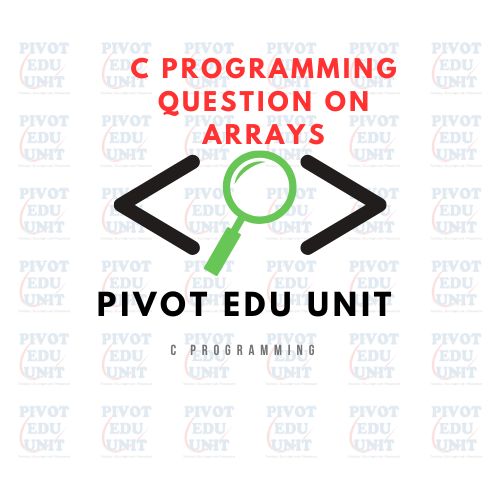Write a C program to find the sum of all elements in an array.
#include <stdio.h>
int main() {
int arr[] = {5, 10, 15, 20, 25};
int sum = 0;
for (int i = 0; i < 5; i++) {
sum += arr[i];
}
printf("Sum of array elements: %d\n", sum);
return 0;
}
Write a C program to find the largest element in an array.
#include <stdio.h>
int main() {
int arr[] = {30, 15, 25, 40, 20};
int max = arr[0];
for (int i = 1; i < 5; i++) {
if (arr[i] > max) {
max = arr[i];
}
}
printf("Largest element in array: %d\n", max);
return 0;
}
Write a C program to find the smallest element in an array.
#include <stdio.h>
int main() {
int arr[] = {30, 15, 25, 40, 20};
int min = arr[0];
for (int i = 1; i < 5; i++) {
if (arr[i] < min) {
min = arr[i];
}
}
printf("Smallest element in array: %d\n", min);
return 0;
}
Write a C program to sort an array in ascending order using Bubble Sort.
#include <stdio.h>
int main() {
int arr[] = {30, 15, 25, 40, 20};
int size = sizeof(arr) / sizeof(arr[0]); // Calculate the size of the array
printf("Original array: ");
for (int i = 0; i < size; i++) {
printf("%d ", arr[i]);
}
printf("\n");
// Sort the array using bubble sort
for (int i = 0; i < size - 1; i++) {
for (int j = 0; j < size - i - 1; j++) {
if (arr[j] > arr[j + 1]) {
int temp = arr[j];
arr[j] = arr[j + 1];
arr[j + 1] = temp;
}
}
}
printf("Sorted array (ascending): ");
for (int i = 0; i < size; i++) {
printf("%d ", arr[i]);
}
printf("\n");
return 0;
}
Write a C program to find the second largest element in an array.
#include <stdio.h>
int main() {
int arr[] = {30, 15, 25, 40, 20};
int size = sizeof(arr) / sizeof(arr[0]); // Calculate the size of the array
int max = arr[0];
int secondMax = arr[0];
for (int i = 1; i < size; i++) {
if (arr[i] > max) {
secondMax = max;
max = arr[i];
} else if (arr[i] > secondMax && arr[i] != max) {
secondMax = arr[i];
}
}
printf("Second largest element in array: %d\n", secondMax);
return 0;
}
Write a C program to find the duplicate elements in an array.
#include <stdio.h>
int main() {
int arr[] = {5, 10, 15, 20, 25, 10, 30, 25};
int size = sizeof(arr) / sizeof(arr[0]); // Calculate the size of the array
printf("Duplicate elements in array: ");
for (int i = 0; i < size - 1; i++) {
for (int j = i + 1; j < size; j++) {
if (arr[i] == arr[j]) {
printf("%d ", arr[i]);
break;
}
}
}
printf("\n");
return 0;
}
Write a C program to find the frequency of each element in an array.
#include <stdio.h>
int main() {
int arr[] = {5, 10, 15, 20, 25, 10, 30, 25};
int size = sizeof(arr) / sizeof(arr[0]); // Calculate the size of the array
printf("Frequency of each element in array:\n");
for (int i = 0; i < size; i++) {
int count = 1;
if (arr[i] == -1) {
continue;
}
for (int j = i + 1; j < size; j++) {
if (arr[i] == arr[j]) {
count++;
arr[j] = -1; // Mark the element as visited
}
}
printf("%d occurs %d times\n", arr[i], count);
Write a C program to find the missing number in an array containing numbers from 1 to N.
#include <stdio.h>
int main() {
int arr[] = {1, 2, 4, 6, 3, 7, 8};
int size = sizeof(arr) / sizeof(arr[0]); // Calculate the size of the array
int n = size + 1;
int total = (n * (n + 1)) / 2; // Sum of first n natural numbers
int sum = 0;
for (int i = 0; i < size; i++) {
sum += arr[i];
}
int missingNumber = total - sum;
printf("Missing number in array: %d\n", missingNumber);
return 0;
}
Write a C program to remove duplicate elements from an array.
#include <stdio.h>
int main() {
int arr[] = {5, 10, 15, 20, 25, 10, 30, 25};
int size = sizeof(arr) / sizeof(arr[0]); // Calculate the size of the array
printf("Array with duplicates removed: ");
for (int i = 0; i < size; i++) {
int isDuplicate = 0;
for (int j = i + 1; j < size; j++) {
if (arr[i] == arr[j]) {
isDuplicate = 1;
break;
}
}
if (!isDuplicate) {
printf("%d ", arr[i]);
}
}
printf("\n");
return 0;
}
Write a C program to add two matrices entered by the user.
#include <stdio.h>
int main() {
int mat1[3][3], mat2[3][3], sum[3][3];
printf("Enter elements of first matrix:\n");
for (int i = 0; i < 3; i++) {
for (int j = 0; j < 3; j++) {
scanf("%d", &mat1[i][j]);
}
}
printf("Enter elements of second matrix:\n");
for (int i = 0; i < 3; i++) {
for (int j = 0; j < 3; j++) {
scanf("%d", &mat2[i][j]);
}
}
printf("Sum of the matrices:\n");
for (int i = 0; i < 3; i++) {
for (int j = 0; j < 3; j++) {
sum[i][j] = mat1[i][j] + mat2[i][j];
printf("%d ", sum[i][j]);
}
printf("\n");
}
return 0;
}
Write a C program to multiply two matrices entered by the user.
#include <stdio.h>
int main() {
int mat1[3][3], mat2[3][3], result[3][3];
printf("Enter elements of first matrix:\n");
for (int i = 0; i < 3; i++) {
for (int j = 0; j < 3; j++) {
scanf("%d", &mat1[i][j]);
}
}
printf("Enter elements of second matrix:\n");
for (int i = 0; i < 3; i++) {
for (int j = 0; j < 3; j++) {
scanf("%d", &mat2[i][j]);
}
}
// Multiplication logic
for (int i = 0; i < 3; i++) {
for (int j = 0; j < 3; j++) {
result[i][j] = 0;
for (int k = 0; k < 3; k++) {
result[i][j] += mat1[i][k] * mat2[k][j];
}
}
}
printf("Product of the matrices:\n");
for (int i = 0; i < 3; i++) {
for (int j = 0; j < 3; j++) {
printf("%d ", result[i][j]);
}
printf("\n");
}
return 0;
}
Write a C program to find the transpose of a matrix entered by the user.
#include <stdio.h>
int main() {
int mat[3][3], transpose[3][3];
printf("Enter elements of the matrix:\n");
for (int i = 0; i < 3; i++) {
for (int j = 0; j < 3; j++) {
scanf("%d", &mat[i][j]);
}
}
// Transpose logic
for (int i = 0; i < 3; i++) {
for (int j = 0; j < 3; j++) {
transpose[j][i] = mat[i][j];
}
}
printf("Transpose of the matrix:\n");
for (int i = 0; i < 3; i++) {
for (int j = 0; j < 3; j++) {
printf("%d ", transpose[i][j]);
}
printf("\n");
}
return 0;
}
Write a C program to check if a matrix is symmetric or not.
#include <stdio.h>
#include <stdbool.h>
bool isSymmetric(int mat[3][3]) {
for (int i = 0; i < 3; i++) {
for (int j = 0; j < 3; j++) {
if (mat[i][j] != mat[j][i]) {
return false;
}
}
}
return true;
}
int main() {
int mat[3][3];
printf("Enter elements of the matrix:\n");
for (int i = 0; i < 3; i++) {
for (int j = 0; j < 3; j++) {
scanf("%d", &mat[i][j]);
}
}
if (isSymmetric(mat)) {
printf("The matrix is symmetric.\n");
} else {
printf("The matrix is not symmetric.\n");
}
return 0;
}
Write a C program to find the sum of each row and each column of a matrix.
#include <stdio.h>
int main() {
int mat[3][3], rowSum[3] = {0}, colSum[3] = {0};
printf("Enter elements of the matrix:\n");
for (int i = 0; i < 3; i++) {
for (int j = 0; j < 3; j++) {
scanf("%d", &mat[i][j]);
rowSum[i] += mat[i][j];
colSum[j] += mat[i][j];
}
}
printf("Sum of each row:\n");
for (int i = 0; i < 3; i++) {
printf("Row %d: %d\n", i + 1, rowSum[i]);
}
printf("Sum of each column:\n");
for (int j = 0; j < 3; j++) {
printf("Column %d: %d\n", j + 1, colSum[j]);
}
return 0;
}
Write a C program to find the sum of all elements in the main diagonal of a square matrix entered by the user.
#include <stdio.h>
int main() {
int mat[3][3];
int sum = 0;
printf("Enter elements of the square matrix:\n");
for (int i = 0; i < 3; i++) {
for (int j = 0; j < 3; j++) {
scanf("%d", &mat[i][j]);
if (i == j) {
sum += mat[i][j];
}
}
}
printf("Sum of main diagonal elements: %d\n", sum);
return 0;
}
Write a program in C to merge two arrays of the same size sorted in descending order.
#include <stdio.h>
int main() {
int arr1[100], arr2[100], arr3[200];
int size1, size2, size3;
int i, j, k;
printf("\nMerge two arrays of the same size sorted in descending order.\n");
printf("--------------------------------------------------------------\n");
printf("Input the number of elements to be stored in the first array: ");
scanf("%d", &size1);
printf("Input %d elements in the first array:\n", size1);
for (i = 0; i < size1; i++) {
printf("Element - %d: ", i);
scanf("%d", &arr1[i]);
}
printf("Input the number of elements to be stored in the second array: ");
scanf("%d", &size2);
printf("Input %d elements in the second array:\n", size2);
for (i = 0; i < size2; i++) {
printf("Element - %d: ", i);
scanf("%d", &arr2[i]);
}
// Merge the arrays
size3 = size1 + size2;
for (i = 0; i < size1; i++) {
arr3[i] = arr1[i];
}
for (j = 0; j < size2; j++) {
arr3[i] = arr2[j];
i++;
}
// Sort the merged array in descending order
for (i = 0; i < size3; i++) {
for (k = 0; k < size3 - 1; k++) {
if (arr3[k] <= arr3[k + 1]) {
int temp = arr3[k + 1];
arr3[k + 1] = arr3[k];
arr3[k] = temp;
}
}
}
// Print the merged array in descending order
printf("\nThe merged array in descending order is:\n");
for (i = 0; i < size3; i++) {
printf("%d ", arr3[i]);
}
printf("\n\n");
return 0;
}
Write a program in C to count the frequency of each element of an array.
#include <stdio.h>
int main() {
int arr[100];
int size;
// Input the size of the array
printf("Enter the size of the array: ");
scanf("%d", &size);
// Input elements of the array
printf("Enter %d elements in the array:\n", size);
for (int i = 0; i < size; i++) {
printf("Element - %d: ", i + 1);
scanf("%d", &arr[i]);
}
// Initialize an array to store frequency of elements
int freq[size];
for (int i = 0; i < size; i++) {
freq[i] = -1;
}
// Count frequency of each element
for (int i = 0; i < size; i++) {
int count = 1;
for (int j = i + 1; j < size; j++) {
if (arr[i] == arr[j]) {
count++;
freq[j] = 0; // Mark as visited
}
}
if (freq[i] != 0) {
freq[i] = count;
}
}
// Print frequency of each element
printf("\nFrequency of each element in the array:\n");
for (int i = 0; i < size; i++) {
if (freq[i] != 0) {
printf("%d occurs %d times\n", arr[i], freq[i]);
}
}
return 0;
}
Write a program in C to separate odd and even integers into separate arrays.
#include <stdio.h>
int main() {
int arr[100], evenArr[100], oddArr[100];
int size, evenCount = 0, oddCount = 0;
// Input the size of the array
printf("Enter the size of the array: ");
scanf("%d", &size);
// Input elements of the array
printf("Enter %d elements in the array:\n", size);
for (int i = 0; i < size; i++) {
printf("Element - %d: ", i + 1);
scanf("%d", &arr[i]);
// Check if the element is even or odd and store in respective arrays
if (arr[i] % 2 == 0) {
evenArr[evenCount++] = arr[i];
} else {
oddArr[oddCount++] = arr[i];
}
}
// Print even integers array
printf("\nEven integers array:\n");
for (int i = 0; i < evenCount; i++) {
printf("%d ", evenArr[i]);
}
printf("\n");
// Print odd integers array
printf("\nOdd integers array:\n");
for (int i = 0; i < oddCount; i++) {
printf("%d ", oddArr[i]);
}
printf("\n");
return 0;
}
Write a program in C to delete an element at a desired position from an array.
#include <stdio.h>
int main() {
int arr[100];
int size, pos;
// Input the size of the array
printf("Enter the size of the array: ");
scanf("%d", &size);
// Input elements of the array
printf("Enter %d elements in the array:\n", size);
for (int i = 0; i < size; i++) {
printf("Element - %d: ", i + 1);
scanf("%d", &arr[i]);
}
// Input the position of the element to delete
printf("Enter the position of the element to delete (1 to %d): ", size);
scanf("%d", &pos);
// Check if position is valid
if (pos < 1 || pos > size) {
printf("Invalid position!\n");
} else {
// Delete element by shifting elements to the left
for (int i = pos - 1; i < size - 1; i++) {
arr[i] = arr[i + 1];
}
// Decrement size of the array
size--;
// Print the updated array
printf("Array after deletion:\n");
for (int i = 0; i < size; i++) {
printf("%d ", arr[i]);
}
printf("\n");
}
return 0;
}
Write a program in C to find the sum of rows and columns of a matrix.
#include <stdio.h>
int main() {
int matrix[100][100];
int rows, cols;
// Input the number of rows and columns of the matrix
printf("Enter the number of rows of the matrix: ");
scanf("%d", &rows);
printf("Enter the number of columns of the matrix: ");
scanf("%d", &cols);
// Input elements of the matrix
printf("Enter elements of the matrix:\n");
for (int i = 0; i < rows; i++) {
printf("Enter elements for row %d:\n", i + 1);
for (int j = 0; j < cols; j++) {
printf("Element [%d][%d]: ", i, j);
scanf("%d", &matrix[i][j]);
}
}
// Calculate sum of rows
printf("\nSum of rows:\n");
for (int i = 0; i < rows; i++) {
int rowSum = 0;
for (int j = 0; j < cols; j++) {
rowSum += matrix[i][j];
}
printf("Row %d: %d\n", i + 1, rowSum);
}
// Calculate sum of columns
printf("\nSum of columns:\n");
for (int j = 0; j < cols; j++) {
int colSum = 0;
for (int i = 0; i < rows; i++) {
colSum += matrix[i][j];
}
printf("Column %d: %d\n", j + 1, colSum);
}
return 0;
}
Write a program in C to accept a matrix and determine whether it is a sparse matrix.
(A sparse matrix is a matrix that contains a large number of zero elements compared to the total number of elements in the matrix. In other words, most of the elements in a sparse matrix have the value of zero.)
#include <stdio.h>
int main() {
int matrix[100][100];
int rows, cols, nonZeroCount = 0;
// Input the number of rows and columns of the matrix
printf("Enter the number of rows of the matrix: ");
scanf("%d", &rows);
printf("Enter the number of columns of the matrix: ");
scanf("%d", &cols);
// Input elements of the matrix
printf("Enter elements of the matrix:\n");
for (int i = 0; i < rows; i++) {
printf("Enter elements for row %d:\n", i + 1);
for (int j = 0; j < cols; j++) {
printf("Element [%d][%d]: ", i, j);
scanf("%d", &matrix[i][j]);
if (matrix[i][j] != 0) {
nonZeroCount++;
}
}
}
// Determine if the matrix is sparse
if (nonZeroCount < (rows * cols) / 2) {
printf("\nThe matrix is a sparse matrix.\n");
} else {
printf("\nThe matrix is not a sparse matrix.\n");
}
return 0;
}
Write a program in C to accept two matrices and check whether they are equal.
#include <stdio.h>
int main() {
int matrix1[100][100], matrix2[100][100];
int rows1, cols1, rows2, cols2;
// Input the number of rows and columns of the first matrix
printf("Enter the number of rows of the first matrix: ");
scanf("%d", &rows1);
printf("Enter the number of columns of the first matrix: ");
scanf("%d", &cols1);
// Input elements of the first matrix
printf("Enter elements of the first matrix:\n");
for (int i = 0; i < rows1; i++) {
printf("Enter elements for row %d:\n", i + 1);
for (int j = 0; j < cols1; j++) {
printf("Element [%d][%d]: ", i, j);
scanf("%d", &matrix1[i][j]);
}
}
// Input the number of rows and columns of the second matrix
printf("\nEnter the number of rows of the second matrix: ");
scanf("%d", &rows2);
printf("Enter the number of columns of the second matrix: ");
scanf("%d", &cols2);
// Check if the dimensions of the two matrices are equal
if (rows1 != rows2 || cols1 != cols2) {
printf("\nThe matrices are not equal (different dimensions).\n");
return 0;
}
// Input elements of the second matrix
printf("Enter elements of the second matrix:\n");
for (int i = 0; i < rows2; i++) {
printf("Enter elements for row %d:\n", i + 1);
for (int j = 0; j < cols2; j++) {
printf("Element [%d][%d]: ", i, j);
scanf("%d", &matrix2[i][j]);
}
}
// Check if the elements of the two matrices are equal
int isEqual = 1; // Assume matrices are equal
for (int i = 0; i < rows1; i++) {
for (int j = 0; j < cols1; j++) {
if (matrix1[i][j] != matrix2[i][j]) {
isEqual = 0; // Matrices are not equal
break;
}
}
if (!isEqual) {
break;
}
}
// Print the result
if (isEqual) {
printf("\nThe matrices are equal.\n");
} else {
printf("\nThe matrices are not equal.\n");
}
return 0;
}




